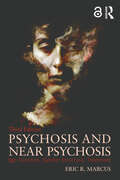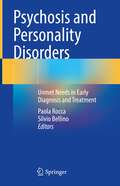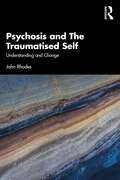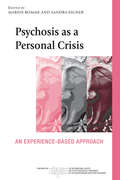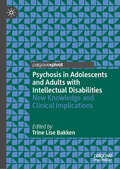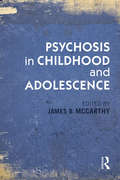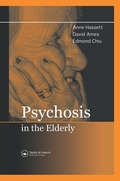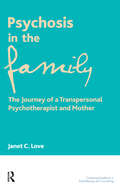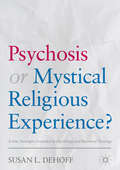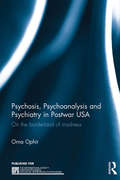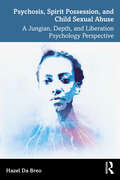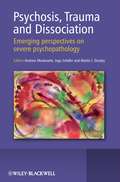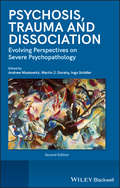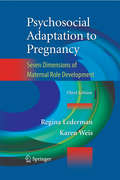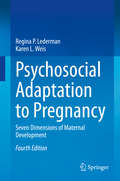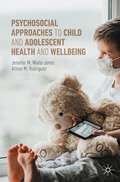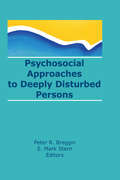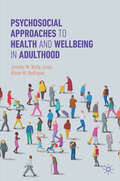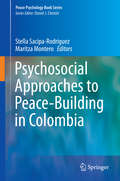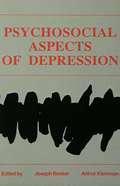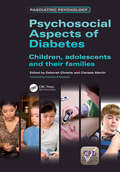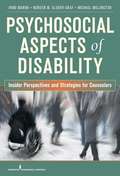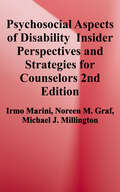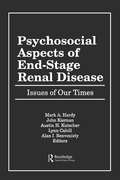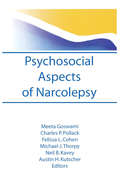- Table View
- List View
Psychosis and Near Psychosis: Ego Function, Symbol Structure, Treatment
by Eric MarcusThe goal of psychotherapy as formulated in this revision of a classic text is to improve ego function of severely disturbed patients who are often hospitalized. This book shows why and how. It describes the psychotherapeutic techniques that aid patients to understand the meaning of the psychotic symbols so that they can experience reality and their emotions as separate entities. Medication effects and the neurobiology of psychotic and near psychotic patients are explained and evaluated in terms of specific ego dysfunction so that psychopharmacology may be targeted. With the first edition originally a recipient of the prestigious Heinz Hartmann Award, this valuable resource is a go-to guide for clinicians who treat patients suffering from crippling mental disorders.The Open Access version of this book, available at http://www.taylorfrancis.com, has been made available under a Creative Commons [Attribution-Non Commercial-No Derivatives (CC-BY-ND)] 4.0 license.
Psychosis and Personality Disorders: Unmet Needs in Early Diagnosis and Treatment
by Paola Rocca Silvio BellinoThis volume offers a detailed and up-to-date analysis of the unmet needs of patients with psychoses and personality disorders. These include the needs associated with early detection of ultra-high-risk populations and first-episode psychosis; recognition of the trajectories of bipolar disorder and schizophrenia, recovery, early intervention, such as the use of LAIs, the conundrum of differential diagnosis in various personality disorders, and unsatisfactory quality of life, even in the presence of symptom control.Intended for clinical psychiatrists and other practitioners interested in mental health, this book helps them to manage the challenges of the diagnostic uncertainty in first-episode psychosis and timely interventions, since the earlier diagnosis is confirmed, the sooner multidisciplinary treatment can be implemented and plans for psychoeducation, and relapse prevention drawn up.
Psychosis and The Traumatised Self: Understanding and Change
by John RhodesPsychosis and the Traumatised Self explores what it is like to experience psychosis for individuals with histories of childhood physical and sexual abuse. The book additionally explores how meaning expressed in psychosis might originate from the effects of abuse, but also long-term life difficulties, motivations, memories, social history, and struggles to narrate and understand. One chapter focuses on refugees who suffered trauma as adults and later became psychotic. Another chapter examines how trauma leads to the destruction of certainty and trust, thereby opening a pathway to persecutory ideas. Drawing on a developmental model of trauma, it is proposed that dissociated parts of the self that developed during childhood contribute to psychosis in adults when undergoing difficulties and stress. Presented with case illustrations, the book will be useful for those who work in the area of psychosis and abuse to understand the experiences of individuals, and how we might develop appropriate therapy and care.
Psychosis as a Personal Crisis: An Experience-Based Approach (The International Society for Psychological and Social Approaches to Psychosis Book Series)
by Marius Romme Sandra EscherPsychosis as a Personal Crisis seeks to challenge the way people who hear voices are both viewed and treated. This book emphasises the individual variation between people who suffer from psychosis and puts forward the idea that hearing voices is not in itself a sign of mental illness. In this book the editors bring together an international range of expert contributors, who in their daily work, their research or their personal acquaintance, focus on the personal experience of psychosis. Further topics of discussion include: accepting and making sense of hearing voices the relation between trauma and paranoia the limitations of contemporary psychiatry the process of recovery. This book will be essential reading for all mental health professionals, in particular those wanting to learn more about the development of the hearing voices movement and applying these ideas to better understanding those in the voice hearing community.
Psychosis in Adolescents and Adults with Intellectual Disabilities: New Knowledge and Clinical Implications
by Trine Lise BakkenThis book provides an overview of the characteristics of psychosis and psychotic symptoms, as well as treatment and interventions, in adolescents and adults with intellectual disabilities. It guides readers to understand key principles in diagnostic assessment, differential diagnostics, and treatment by examining the manifestations of psychotic symptoms and providing diagnostic tools and checklists. The research history and phenomenology of the symptoms is complemented with a discussion of the most common diagnostic challenges: is it psychosis, or autism spectrum disorder, PTSD, OCD, anxiety, or physical or neurological disorders, or physical pain? This accessible volume includes perspectives on developmental, behavioural, emotional, and language impairments, and the importance of these factors in establishing adequate therapy. Combination therapy of antipsychotics and psychosocial interventions is also discussed, including psychotherapy, psychoeducation, group therapy, and multifamily groups. Drawing on research-based practice, the authors present several treatment settings to support people with intellectual disabilities and their families, as well as specialist in- and outpatient mental health services, habilitation services, and community services. This is an invaluable resource for students, clinicians, service providers, users, and families involved in the clinical care for people with intellectual disabilities and concurrent psychosis.
Psychosis in Childhood and Adolescence
by James B. McCarthyPsychosis in Childhood and Adolescence offers an in-depth examination of the nature of psychosis, its risk factors and its manifestations in children and adolescents who experience a continuum of emotional disorders. The chapters present a hopeful, research-based framework for treatment. They emphasize combined treatment that is based on psychodynamic and cognitive behavioral psychotherapy principles, pharmacological interventions and supportive family approaches that reflect the vulnerabilities and resources of the individual child. This text highlights the importance of thorough assessment and the need for long-term treatment that facilitates the psychotic child’s healthy maturation. Readers will benefit from the case examples that illustrate the complexity of psychosis and the discussions of diagnostic and treatment issues as presented by experienced clinicians and researchers.
Psychosis in the Elderly
by David Ames Anne M. Hassett Edmond ChiuAcross the spectrum of psychopathology in later life, psychotic symptomatology has been the most neglected, and although literature in this area is increasing, this is the first book to address the need for an overarching framework to examine and understand late-life psychotic phenomena. Exploring the practical and ethical issues that arise when ma
Psychosis in the Family: The Journey of a Transpersonal Psychotherapist and Mother (The\united Kingdom Council For Psychotherapy Ser.)
by Janet C. LoveThis is a book written not just by a professional transpersonal psychotherapist but by someone who has walked the heart-rending path and experienced the psychological trauma of loving someone in psychosis; psychosis which still remains the greatest taboo in society today, together with its implicit diagnosis of a lifelong sentence of medication and no cure. It is in the main a personal and moving narrative of a mother looking to help her son avoid such a lifelong sentence of medication whilst trying to research holistic resources and alternative approaches for treatment at the same time as negotiating the vagaries of the current mental health system. It is often a tale of despair and frustration, yet also gives a compassionate voice. Transpersonal and transgenerational psychotherapeutic insights back up the personal narrative. It includes an accessible inquiry into how unconscious forces influence our mind, our bodies and the entire family system. Its hypothesis is that if we cannot understand our own unconscious responses how can we understand those of our loved ones in psychotic episodes?
Psychosis or Mystical Religious Experience?
by Susan L. DeHoffThis book presents a new paradigm for distinguishing psychotic and mystical religious experiences. In order to explore how Presbyterian pastors differentiate such events, Susan L. DeHoff draws from Reformed theology, psychological theory, and robust qualitative research. Following a conversation among multidisciplinary voices, she presents a new paradigm considering the similarities, differences, and possible overlap of psychotic and mystical religious experiences.
Psychosis, Psychoanalysis and Psychiatry in Postwar USA: On the borderland of madness (The International Society for Psychological and Social Approaches to Psychosis Book Series)
by Orna OphirCovering the last four decades of the 20th century, this book explores the unwritten history of the struggles between psychoanalysis and psychiatry in postwar USA, inaugurated by the neosomatic revolution, which had profound consequences for the treatment of psychotic patients. Analyzing and synthesizing major developments in this critical and clinical field, Orna Ophir discusses how leading theories redefined what schizophrenia is and how to treat it, offering a fresh interpretation of the nature and challenges of the psychoanalytic profession. The book also considers the internal dynamics and conflicts within mental health organizations, their theoretical paradigms and therapeutic practices. Opening a timely debate, considering both the continuing relevance and the inherent limitations of the psychoanalytic approach, the book demonstrates how psychoanalysts reinterpreted their professional identity by formalizing and disseminating knowledge among their fellow practitioners, while negotiating with neighboring professions in the medical fields, such as psychiatry, pharmacology and the burgeoning neurosciences. Chapters explore the ways in which psychoanalysts constructed – and also transgressed upon – the boundaries of their professional identity and practice as they sought to understand schizophrenia and treat its patients. The book argues that among the many relationships psychoanalysis sustained with psychiatry, some weakened their own social role as service providers, while others made the theory and practice of psychoanalysis a viable contender in the jurisdictional struggles between professions. Psychosis, Psychoanalysis and Psychiatry in Postwar USA will appeal to researchers, academics, graduate students and advanced undergraduates who are interested in the history of psychoanalysis, psychiatry, the medical humanities and the history of science and ideas. It will also be of interest to clinicians, health care professionals and other practitioners.
Psychosis, Spirit Possession, and Child Sexual Abuse: A Jungian, Depth, and Liberation Psychology Perspective
by Hazel Da BreoThis distinctive volume examines the psychological claims of spirit possession and psychosis as they are linked to child sexual abuse, intimate partner violence, and poor mental health.In the context of both clinical complaints and community-based determinants, this book uses Jungian and Fanonian theory, political history, and case study analysis to explore the systems at work in projecting internalized traumas of colonialism and personal powerlessness onto a scapegoated demonic presence affecting victims/survivors of sexual violence. It focuses on populations of the global south but is relevant to victims of oppression worldwide, considering the personal unconscious and cultural complexes that influence a sense of being overtaken and controlled by supernatural or intrapsychic forces, or a desire to be.Psychosis, Spirit Possession, and Child Sexual Abuse offers an alternative framework for understanding mental processes that lead to symptoms such as auditory or visual hallucinations that often get misdiagnosed and mistreated. This is important reading for practitioners and scholars of depth psychology and is of keen interest to academics in the fields of foreign and cultural studies, as well as students and researchers in sociology, religion, or anthropology.
Psychosis, Trauma and Dissociation: Emerging Perspectives on Severe Psychopathology
by Martin Justin Dorahy Andrew Moskowitz Ingo SchaferIn the 100 years since Eugen Bleuler unveiled his concept of schizophrenia, which had dissociation at its core, the essential connection between traumatic life events, dissociative processes and psychotic symptoms has been lost. <P><P>Psychosis, Trauma and Dissociation is the first book to attempt to reforge this connection, by presenting challenging new findings linking these now disparate fields, and by comprehensively surveying, from a wide range of perspectives, the complex relationship between dissociation and psychosis.A cutting-edge sourcebook, Psychosis, Trauma and Dissociation brings together highly-respected professionals working in the psychosis field with renowned clinicians and researchers from the fields of traumatic stress, dissociation and the dissociative disorders, and will be of interest to those working with or studying psychotic or dissociative disorders, as well as trauma-related conditions such as borderline personality disorder or complex post-traumatic stress disorder. It makes an invaluable contribution to the burgeoning literature on severe mental disorders and serious life events. The book has three sections:Connecting trauma and dissociation to psychosis - an exploration of the links between trauma, dissociation and psychosis from a wide range of historical and theoretical perspectives. Comparing psychotic and dissociative disorders - a presentation of empirical and clinical perspectives on similarities and differences between the two sets of disorders.Assessing and treating hybrid and boundary conditions - consideration of existing and novel diagnostic categories, such as borderline personality disorder and dissociative psychosis, that blend or border dissociative and psychotic disorders, along with treatment perspectives emphasising humanistic and existential concerns.
Psychosis, Trauma and Dissociation: Evolving Perspectives on Severe Psychopathology
by Andrew Moskowitz Martin J. Dorahy Ingo SchäferAn invaluable sourcebook on the complex relationship between psychosis, trauma, and dissociation, thoroughly revised and updated This revised and updated second edition of Psychosis, Trauma and Dissociation offers an important resource that takes a wide-ranging and in-depth look at the multifaceted relationship between trauma, dissociation and psychosis. The editors – leaders in their field – have drawn together more than fifty noted experts from around the world, to canvas the relevant literature from historical, conceptual, empirical and clinical perspectives. The result documents the impressive gains made over the past ten years in understanding multiple aspects of the interface between trauma, dissociation and psychosis. The historical/conceptual section clarifies the meaning of the terms dissociation, trauma and psychosis, proposes dissociation as central to the historical concepts of schizophrenia and borderline personality disorder, and considers unique development perspectives on delusions and the onset of schizophrenia. The empirical section of the text compares and contrasts psychotic and dissociative disorders from a wide range of perspectives, including phenomenology, childhood trauma, and memory and cognitive disturbances, whilst the clinical section focuses on the assessment, differential diagnosis and treatment of these disorders, along with proposals for new and novel hybrid disorders. This important resource: • Offers extensive updated coverage of the field, from all relevant perspectives • Brings together in one text contributions from scholars and clinicians working in diverse geographical and theoretical areas • Helps define and bring cohesion to this new and important field • Features nine new chapters on: conceptions of trauma, dissociation and psychosis, PTSD with psychotic features, delusions and memory, trauma treatment of psychotic symptoms, and differences between the diagnostic groups on hypnotizability, memory disturbances, brain imaging, auditory verbal hallucinations and psychological testing Written for clinicians, researchers and academics in the areas of trauma, child abuse, dissociation and psychosis, but relevant for psychiatrists, psychologists and psychotherapists working in any area, the revised second edition of Psychosis, Trauma and Dissociation makes an invaluable contribution to this important evolving field.
Psychosocial Adaptation to Pregnancy
by Karen Weis Regina LedermanThe book presents an analysis of seven dimensions of maternal psychosocial development during pregnancy. They serve as the foundation for assessment of maternal prenatal adaptation and for psychoeducational and counseling intervention to enhance maternal adaptation. The seven dimensions of maternal adaptation pertain to motivation for and acceptance of the pregnancy, processes involved in evolving a maternal role prenatally, changes in significant kin relationships (with husband/partner and mother), and preparatory emotional, physical, and adaptive processes for labor and delivery. The approach is a scientific analysis of maternal adaptive and maladaptive responses within each psychosocial dimension with excerpts of maternal responses to illustrate differences in adaptation. The book is proposed to address a void in human psychosocial assessment.
Psychosocial Adaptation to Pregnancy: Seven Dimensions of Maternal Development
by Regina P. Lederman Karen L. WeisThe fourth edition of this book updates and elaborates on the seven dimensions of maternal emotional health that have significant impact on delivery, postpartum adaptation, infant health, and early childhood development. Supported by the authors’ original research and interviews, the book provides readers with an analysis of the role of these core functions throughout pregnancy, as well as practical materials for use with pregnant clients in the form of assessment instruments and evidence-based interventions for promoting positive development. The book provides a theoretical framework with rationales for the seven psychosocial dimensions, therapeutic and counseling intervention strategies to improve adaptive development in each of the seven psychosocial dimensions, findings specific to women in diverse cultural groups, a chapter devoted to women in the military and military spouses, and discussion of salient issues of pregnancy, including physical changes, body image, intimacy, trust, and ambivalence.The book focuses on the seven dimensions of maternal prenatal emotional health:Acceptance of the pregnancy.Motivation and preparation for motherhood.Relationship with husband/partner.Relationship with her own mother. Preparation for labor.Sense of control in laborSelf-Esteem and Well-Being in labor. Psychosocial Adaptation to Pregnancy is a significant addition to the psychosocial assessment literature, a needed resource for clinical and health psychologists, clinical social workers, marriage and family therapists, professional counselors, midwives, and obstetrical nurses. It is also adaptable to undergraduate and graduate courses in maternal reproductive health and obstetrical nursing.
Psychosocial Approaches to Child and Adolescent Health and Wellbeing
by Jennifer M. Waite-Jones Alison M. RodriguezThis textbook provides an engaging guide to psychosocial theories of child and adolescents’ wellbeing, demonstrating how psychology and sociology can be used to address key contemporary issues for those working with children and adolescents. It begins with an examination of the socially constructed nature of ‘childhood’ and ‘adolescence’, and impact of cultural context on the conditions for ‘well-being’, before outlining core psychological and sociological theories of childhood and adolescence. It adopts a psychosocial approach to illustrate the influence of social context on biologically based development in relation to topics including attachment, learning, play, parenting, family life, deviance, medicalisation, long-term conditions, vulnerability, and resilience. Through encouraging analysis of a practice-oriented case study and offering reflective questions it provides a robust introduction to how psychosocial perspectives may be applied within health, social care, and education contexts. It offers students of Social Work, Nursing, Education, Psychology and Child and Adolescent Studies the critical and theoretical tools to evaluate the interlocking psychosocial factors influencing the lives of those who will be in their care.
Psychosocial Approaches to Deeply Disturbed Persons
by E Mark Stern Peter R BregginAt a time when biological psychiatry claims that drugs and electroshock are the best methods for helping deeply disturbed persons, mental health professionals need to be reminded that psychological and social approaches to mental illnesses remain more effective, less harmful, and much more able to address the real needs of recovery, growth, and development for affected persons. Psychosocial Approaches to Deeply Disturbed Persons empowers counselors, psychiatrists, psychologists, and social workers to trust their intuitive and clinical understanding of how to help seriously disturbed people through humane, caring approaches.Psychosocial Approaches to Deeply Disturbed Persons introduces mental health professionals to an array of psychological and social alternatives that are available for helping patients considered “psychotic” or very emotionally disturbed. Focusing on psychological and social approaches to helping people who become labeled “psychotic” or who carry serious psychiatric diagnoses, contributors show mental health professionals psychological, social, and spiritual alternatives for approaching or treating these individuals. Readers learn about: a successful model for nonmedical, non-drug residential treatment centers utilizing the artwork of psychotic patients case histories of psychoanalytic therapy group therapy to help families with a “schizophrenic” member improve communication Re-evaluation Counseling (RC) with disturbed individuals psychoanalytically-oriented therapy World Health Organization research which demonstrates the positive effect of extended family and social relationships and the negative effect of modern biopsychiatric treatment research demonstrating the efficacy of psychotherapy with persons labeled “schizophrenic”These chapters combined with a review of empirical studies demonstrate to readers the efficacy of psychotherapy with psychotic patients. Students or experienced professionals in any of the mental health fields, including psychotherapy, counseling, clinical psychology, clinical social work, and Re-evaluation Counseling will find Psychosocial Approaches to Deeply Disturbed Persons a necessity for most effectively and humanely treating clients with serious psychiatric diagnoses.
Psychosocial Approaches to Health and Wellbeing in Adulthood
by Jennifer M. Waite-Jones Alison M. RodriguezThis textbook provides an up-to-date guide to theories within psychology and sociology relevant to understanding the major life transitions within adulthood and older age and demonstrates how they can be applied in practice. In doing so, it offers a psychosocial approach that will equip readers to meet the combined physical, psychological and social needs of those in their care. In this book the impact of biological factors on adult experience is acknowledged alongside a careful exploration of the socially constructed nature of different stages of adulthood across the lifespan. In its analysis of developmental stages, the book covers key issues of current concern including emerging and early adulthood, &‘the sandwich generation&’ (those caring for both their children and their parents), later life, medicalisation, neurodiversity, long term and degenerative conditions, bereavement, and grief. Both vulnerabilities and ways to enhance resilience encouraging healthy ageing are examined. Utilising practice-oriented case studies and reflective questions it illustrates how psychosocial perspectives may be applied within family, workplace, health, and social care contexts. It offers under graduate and graduate students of social work, nursing, mental health, education, psychology, human development, gerontology and ageing, the tools needed to evaluate the interlocking psychosocial factors influencing the lives of adults at different stages of life.
Psychosocial Approaches to Peace-Building in Colombia
by Maritza Montero Stella Sacipa-RodriguezThis edited volume summarizes the work of a research group, called Social Bonds and Cultures of Peace that accompanies and supports victims of socio-political violence in Columbia. The individual chapters focus on the ongoing violence in the Colombian context, a complex and dynamic area in which various groups (drug traffickers, national armed forces, guerrilla fighters, self-defence groups) have been engaged in organized violence for more than 60 years. Emphasis is placed on the psychological consequences of violence and various forms of psychosocial support that psychologists have been providing to the victims of violence. Central to their work is the notion of "accompanying" those who have been victims of violence, listening to them, engaging them in dialogue and working together to strengthen the resources of victims. The recovery of individual and collective memories of atrocities is discussed as an important avenue for healing and for the empowerment of individuals and groups. The solidarity among victims creates opportunities at the grassroots level to pursue truth, reveal perpetrators of violence, seek public acknowledgment and attain social justice. For perpetrators of violence and members of armed groups, the book addresses a host of psychosocial issues related to disarming, demobilizing and reintegrating former combatants, including children, into society. Throughout the book, in the spirit of peace psychology, the researchers are engaged in a form of praxis that is cognizant of the wider geohistorical context within which victims and perpetrators are embedded and the dialectical relationship between micro and macro-level events and change. Researchers in Latin American studies, peace psychology, social justice and transitional justice, will find this volume to be an excellent resource.
Psychosocial Aspects of Depression
by Arthur Kleinman Joseph BeckerDespite general agreement that psychosocial factors play an important role in various facets of the etiology, onset, treatment response and outcome of depressive disorders, the replicability of research results has left much to be desired. Because much of this unreliability has been attributed to variability in diagnostic criteria, this volume focuses on efforts to identify sources of variability in the definition and diagnosis of depressive disorders within Western society and cross-culturally. It also explicates the elusive role of aversive life events in the development and course of depressive disorders, deals with the interpersonal experiences and dispositions related to the vulnerability and maintenance of depression, and addresses an often neglected issue: how stress and social support affect the quality and response to treatment received. The text concludes with the presentation of an integrative framework for vulnerability to recurrent depressions which emphasizes the interaction of biological and psychosocial factors as largely mediated by personality and temperament.
Psychosocial Aspects of Diabetes: Children, Adolescents and Their Families
by Clarissa Martin Christie DeborahPart of the Paediatric Psychology series Children and young people are increasingly among those being diagnosed with diabetes. However in the UK only 1 in 6 children succeed in controlling their diabetes successfully, despite support from parents and professionals. This enlightening new book is a comprehensive account of diabetes and the complex medical and psychosocial factors that influence metabolic control in children and young people. It presents a series of evidence-based and accessible educational, psychological and social approaches to increase specialist knowledge, promote positive attitudes, enhance patient care and create appropriate healthcare environments. The book offers an easy-to-comprehend approach to clinical care and includes practical tools for assessment for all healthcare professionals throughout the text. Featuring contributions from a number of international experts in the field, this thorough and wide-ranging guide is informative reading for all students, academics and professionals with an interest in paediatric psychology and health.
Psychosocial Aspects of Disability: Insider Perspectives and Counseling Strategies
by Irmo Marini Noreen M. Glover-Graf Michael Jay MillingtonWhat a marvelous and amazing textbook. Drs. Marini, Glover-Graf and Millington have done a remarkable job in the design of this highly unique book, that comprehensively and very thoughtfully addresses the psychosocial aspects of the disability experience. These highly respected scholars have produced a major work that will be a central text in rehabilitation education for years to come. From the Foreword by Michael J. Leahy, Ph. D. , LPC, CRC Office of Rehabilitation and Disability Studies Michigan State University This is an excellent book, but the best parts are the stories of the disabled, which give readers insights into their struggles and triumphs. " Score: 94, 4 Stars--Doody's Medical Reviews What are the differences between individuals with disabilities who flourish as opposed to those who never really adjust after a trauma? How are those born with a disability different from individuals who acquire one later in life? This is the first textbook about the psychosocial aspects of disability to provide students and practitioners of rehabilitation counseling with vivid insight into the experience of living with a disability. It features the first-person narratives of 16 people living with a variety of disabling conditions, which are integrated with sociological and societal perspectives toward disability, and strategies for counseling persons with disabilities. Using a minority model perspective to address disability, the book focuses on historical perspectives, cultural variants regarding disability, myths and misconceptions, the attitudes of special interest and occupational groups, the psychology of disability with a focus on positive psychology, and adjustments to disability by the individual and family. A wealth of counseling guidelines and useful strategies are geared specifically to individual disabilities. Key Features: Contains narratives of people living with blindness, hearing impairments, spinal cord injuries, muscular dystrophy, polio, mental illness, and other disabilities Provides counseling guidelines and strategies specifically geared toward specific disabilities, including "dos and don'ts" Includes psychological and sociological research relating to individual disabilities Discusses ongoing treatment issues and ethical dilemmas for rehabilitation counselors Presents thought-provoking discussion questions in each chapter Authored by prominent professor and researcher who became disabled as a young adult
Psychosocial Aspects of Disability: Insider Perspectives and Strategies for Counselors
by Irmo Marini Michael J. Millington Noreen M. GrafWhat are the differences between individuals with disabilities who flourish and those who never really adjust after a trauma? How do those born with a disability differ from individuals who acquire one later in life? <p><p>Fully updated and revised, this second edition of a unique rehabilitation counseling text reflects growing disparities among "haves" and "have-nots" as they bear on the psychosocial aspects of disability. New content focuses on returning veterans afflicted with physical and mental health problems, persons with disabilities living in poverty, and the need for increased family and community-based engagement. The book provides updated information about assisted suicide, genetic testing, new legislation, and much more. <p><p>Using a minority model perspective, the text provides students and practitioners of rehabilitation and mental health counseling with vivid insight into the experience of living with a disability. It features first-person narratives from people living with a variety of disabling conditions, which are integrated with sociological and societal perspectives toward disability, and strategies for counseling such individuals. The text encompasses a historical perspective, psychological and sociological research, cultural variants regarding disability, myths and misconceptions, the attitudes of special interest and occupational groups, the use of positive psychology, and adjustments to disability by the individual and family. A wealth of counseling guidelines and useful strategies is geared to individuals with specific disabilities. Designed for a 15-week semester, the book also includes thought-provoking discussion questions and exercises.
Psychosocial Aspects of End-Stage Renal Disease: Issues of Our Times
by Austin H. Kutscher Mark A. Hardy John Kiernan Lynn Cahill Alan I. BenvenistyThis thoughtful new book presents strategies for helping end-stage renal disease patients and their families deal with the psychosocial aspects of the chronic long-term illness. Technological advances in the treatment of this disease have offered much hope for improved quality in living which has led caregivers to have a greater concern for preserving the quality of life of their patients. In Psychosocial Aspects of End-Stage Renal Disease leaders in the field of many disciplines share knowledge and reveal problems that are still evident to them in the confrontation with this potentially fatal illness.Five comprehensive sections devote special attention to the different areas of concern for the psychosocial well-being of end-stage renal disease patients. The impact of renal disease on family relationships is covered by examining issues of family responses and coping measures such as marital and family reactions to home and hospital dialysis treatment. Ethical issues in treatment are explored, including the ethics of treatment refusal and a Jewish perspective on kidney transplants. Relations between staff and patients and a timely section on renal disease and special populations, particularly the elderly and AIDS patients, make up the final two sections of this informative volume. Professionals in all allied health disciplines will benefit from this important volume as it demonstrates a model approach, if not the definitive one, for the treatment of the psychosocial aspects of end-stage renal disease as well as other chronic illnesses.
Psychosocial Aspects of Narcolepsy
by Meeta Goswami Charles P PollakThis groundbreaking book focuses on the impact narcolepsy has on a person’s day-to-day life. It addresses the diagnosis, treatment, and management of narcolepsy with particular emphasis on psychological and social aspects of care. A multidisciplinary team of nationally and internationally respected scientists, researchers, and clinicians discuss the detrimental effects narcolepsy has on interpersonal relationships, employment, education, recreation, and other aspects of everyday life, from driving an automobile to sexual relations. Narcolepsy’s effects on these and other daily activities are often neglected in the study of the disorder. This book brings into focus the personal and social costs of narcolepsy and discusses the often enormous impact that narcolepsy can have on a person’s self-esteem and quality of life.Typically it takes about fifteen years for a person to be accurately diagnosed as having narcolepsy. Psychosocial Aspects of Narcolepsy is an aid to help caregivers and healthcare providers screen individuals with symptoms of daytime sleepiness and refer them promptly to appropriate professionals for diagnosis and help. The book helps these professionals find the most effective treatment methods and coping strategies for their patients who suffer from symptoms such as excessive daytime sleepiness, cataplexy, and hypnagogic hallucinations. Informative chapters address a wide variety of pertinent issues, including: differential diagnosis and treatment of narcolepsy the special needs of persons with narcolepsy a sociomedical model for a narcolepsy counseling service the psychosocial impact of narcolepsy on the individual and the family sociodemographic variables in narcolepsy the quality of life of persons with narcolepsy the diagnosis, treatment, and psychosocial consequences of sleep apnea the legal aspects of narcolepsy narcolepsy’s profound impact on childrenThis vital resource enables physicians and other health professionals to give optimum, comprehensive care to individuals suffering from narcolepsy. Full of informative studies and helpful coping strategies, Psychosocial Aspects of Narcolepsy belongs on the desk of every person who wants to understand the impact of narcolepsy more thoroughly and who wishes to improve the quality of life of those with the disorder.
